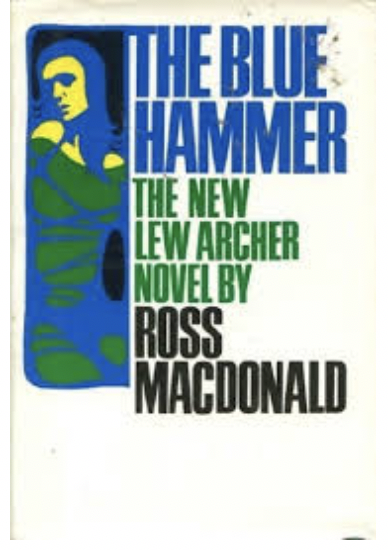
The Marple Township Library, 1973
I was a first-year law student, living near a public library in a Philadelphia suburb. I hadn’t used a public library since I was in grade school, but I was broke, and it was a block from my apartment. I hadn’t read any mysteries at that point, either. I had tried some Sherlock Holmes and didn’t like them. The closest I came to the genre was The Spy Who Came in From the Cold, which I appreciated as a good piece of writing even though the plot was confusing.
I remember my eye falling on the cover of The Blue Hammer. It was an Abstract Expressionist image in yellow, blue, and green of a bound woman. The face had no detail but even the slight outlines conveyed a sense of helplessness and danger. I picked up the book. I was vaguely aware that there was a mystery writer named Macdonald, but I hadn’t grasped that there was a Ross Macdonald as well as a John D. MacDonald. I took it home and was enthralled. I had avoided mysteries because I knew I wouldn’t like Mickey Spillane. This book opened my eyes. And towards the end, when I read:
“I could see the steady blue pulse in her temple, the beating of the silent
hammer that told me she was alive. I hoped the blue hammer would never
stop.”
Clear, simple words that told me everything I needed to know about how the speaker felt about the woman and what kind of a man he was. At that moment I knew that I was in the presence of a writer so good, I had to read more.
The Rest of the Story
It’s a good anecdote, and because I am often asked at book signings how I came to write mysteries, I have told it many times. When I began thinking about this blog it made sense to use it again. But I’m not telling you the story for the reason you think. I’m not offering it as something about me.
Because it’s not true.
As a matter of fact, it’s impossible.
When I began work on this post, I discovered that The Blue Hammer wasn’t published until 1976. By the time it appeared I was a lawyer in a town sixty miles away and I never held a library card again till this year.
I don’t know what book I borrowed from that library—maybe Sleeping Beauty or The Underground Man. But no one could confuse their covers with the one I remember so vividly. I have no explanation, except to think about the irony of it. Ross Macdonald was in the business of shaking people’s foundational myths. In every book, from the first to the last, characters are proven wrong about fundamental facts that have shaped their lives. Facts about their parentage and every other aspect of their family life. He showed that even important memories could be false and unreliable. He was very good at his job. A healthy respect for that magic and the importance of his concerns is a good place for us to start.